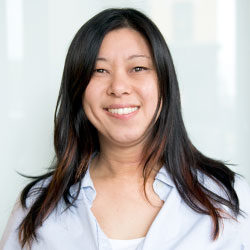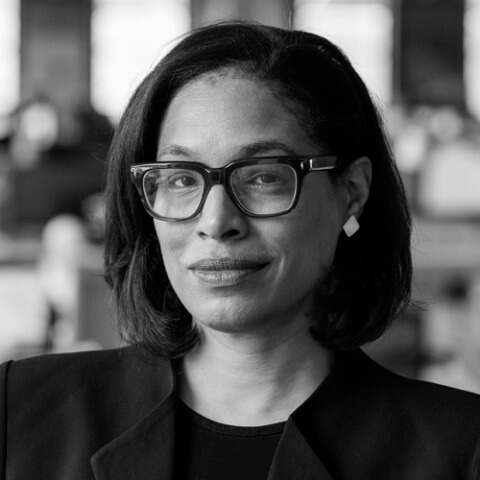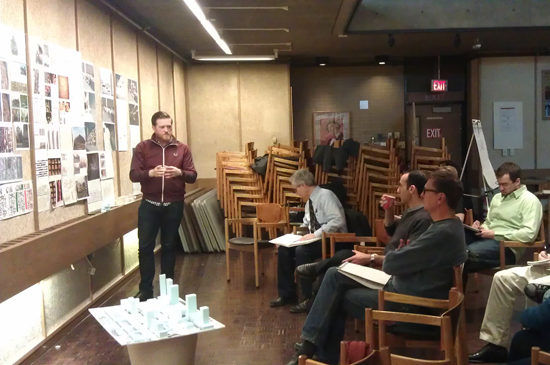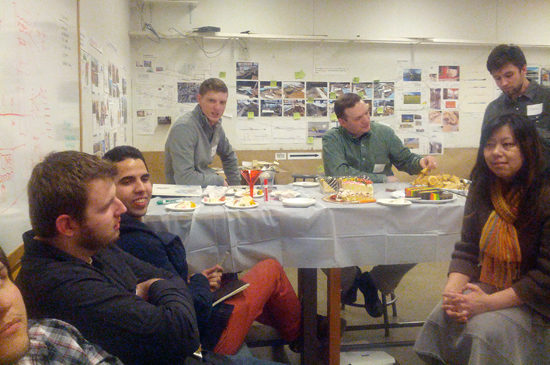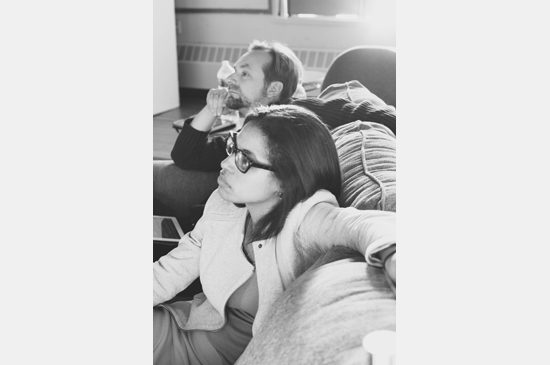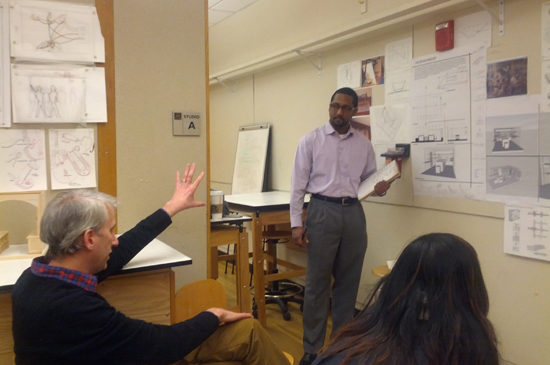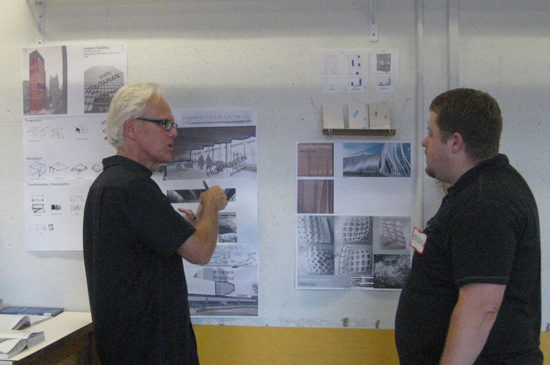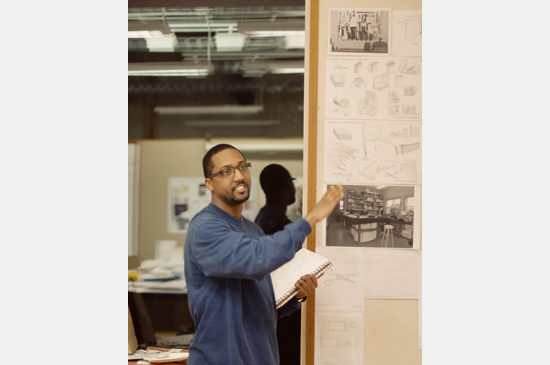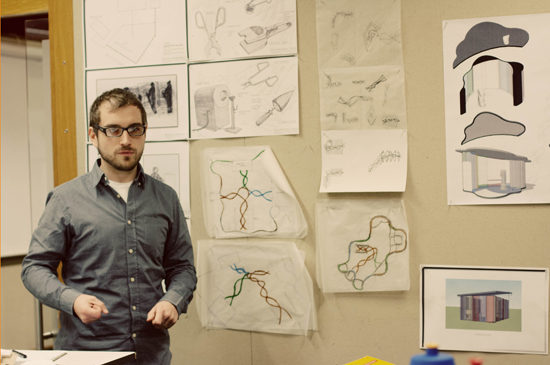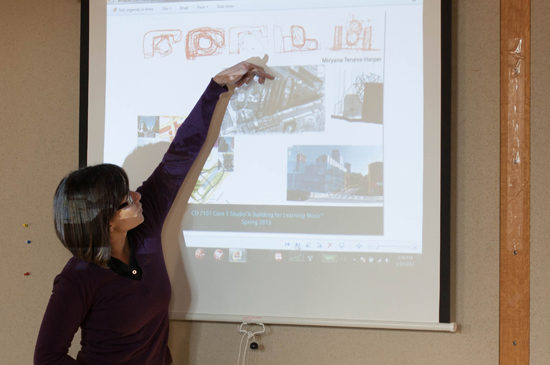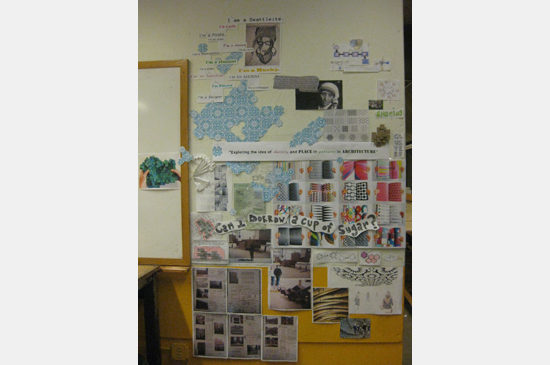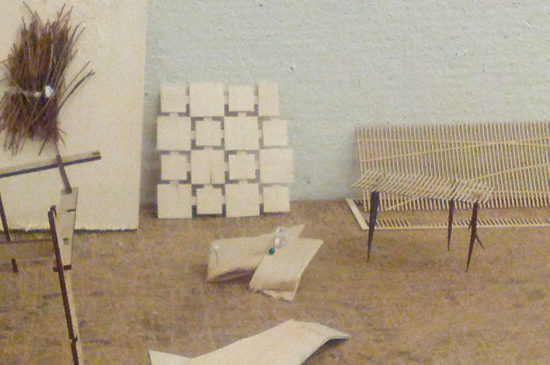
Earlier this month, four members of the PAYETTE staff taught studio at the Boston Architectural College (BAC) for the Distance M.Arch Program. This distance learning program is a sequence of prescribed courses taken in seven semesters over three and one-half years. This program is unique because course work is accomplished through rigorous online exchanges in graphic, text, and audio formats. The students hail from all over the world in this program, including students from almost every state, Canada, Germany and Japan. The students and faculty become extremely close because the program involves an eight-day residency in Boston once each semester, called an Intensive, which is what occurred earlier this month. During the Intensive, faculty set up studio and worked with students from 8AM to 10PM each day to develop their studio work. The week culminates with reviews for each studio, which several @PAYETTEpeople attended. Follow the program’s progress and work on Twitter via @distancemarch.
Core C-1 Studio
I teach Core C-1 Studio, which is a preliminary course for students in their first and second years of the Distance M.Arch program. The theme of this studio is Programming as a Generator of Design. During their recent visit to Boston, the students spent the first part of the week completing a sketch problem in which they researched and designed a workspace for a craftsperson. The craftsperson workspace assignment was inspired by the programs offered at the North Bennet School (NBS) located in Boston’s historic North End neighborhood. During the week, the students toured the school and interviewed instructors and students. This visit became an invaluable experience as the students developed what they learned at NBS to author a building program that housed all of their respective craftspeople under one roof. During the week, students engaged in repetitive model making exercises and drawing assignments that focused on the movement of the human body within a workspace. Now equipped with a program, site and early site investigations, the students are charged with developing an Artisan Collaborative in the Back Bay of Boston. The four students in the studio bonded during the week and committed to maintain the collaborative spirit that comes out of the Intensive’s rigorous studio environment. The goal for the remainder of the semester requires students build on the momentum established at the Intensive with the assistance of the BAC’s online collaborative tools and WebEx ‘virtual’ group reviews.

Thesis Prep: Research + Writing and Thesis Prep: Studio
[co-taught with Mike Wolfson, Director of D.MArch Thesis]
I have been teaching and developing the pedagogy for the Thesis curriculum for the Distance M.Arch for the past six years since the inception of the program. The foundation of Thesis Preparation (Semester 5 of the program) is formed by two classes, Graduate Research & Writing and Studio. Graduate Research & Writing contextualizes student thesis topics while Studio is an opportunity for students to test emerging ideas through concrete sketch problems and design work. Students integrate work from both classes into their Thesis Proposals, which is due towards the close of Semester 5.
In the two weeks prior to the class’ visit to Boston, Thesis Prep students worked on a number of small assignments to review their portfolios, searching for recurring ideas, which encourages students to become self-aware of patterns in their own work through documentation and analysis. Additionally, these assignments allow students to explore ideas that could develop into a larger thesis idea. While in Boston, the students learned through lecture how Thesis Statements are developed along with Methodology for testing ideas and Terms of Criticism to evaluate the success of their work. We quickly jumped to Thesis Dialogue Formation sessions to create an individual thesis direction (generative topic) for each individual. Students accomplished between 4 and 10 sketch problems throughout the week, as well as attending lectures and several field trips which were tailored to their topics. The week culminated in a “Mocktail Party” where the students met one-on-one with many diverse professionals, ranging from poets to architects to computer programmers to marketing specialists, who provided insight into the work, additional avenues for contextual research and design specific opportunities to test students’ emerging thesis ideas.

C1 Studio: Concept & Context
The third semester studio focuses on concept formation and context. The main objective of the Intensive week is for students to clearly articulate their ideas and concepts “behind” the design and begin to translate their vision into architectural drawings.
While there is always a specific site located within the urban fabric of Boston, the students are encouraged to think beyond the boundaries of the parcel and consider the wider context. During the first two days of the Intensive, themes such as streetscape, placemaking and urban morphology help define a design agenda and a rough massing that embraces the complexity and richness of the urban space.
Students then develop an attitude in regards to the program, which typically consists of a music school with larger performance spaces as well as smaller practice rooms and learning spaces. Case studies prepared during the first two weeks of the semester may be a source of inspiration, but primarily familiarize students with this program type. Instead, students are encouraged to look outside the realm of architecture to formulate their vision.
A mid-week presentation provides the opportunity to bundle all ideas in a coherent story and also forges relationships between semesters. The Intensive phase culminates in a presentation of the key design concepts expressed in diagrams and sketches. The energy, group dynamics and personal relationships that form during this week allow students to advance the design work in the following 7 off-site weeks. In addition to regular one-on-one Skype sessions the students help each other by commenting on their work and sharing progress in WebEx meetings.
I have been teaching this studio since 2007 and helped integrate the urban design agenda into the curriculum.

Thesis 1
[co-taught with Ariane Purdy, AIA Leed AP]
THESIS 1 picks up with the conceptual design ideas explored at the end of Thesis Prep Studio. Thesis 1 focuses on the design and research that fully test and demonstrate each student’s thesis ideas.
The Intensive weeks offers an opportunity for the students to explore design work using the facilities of the BAC. Because students work from a distance (at home), far from a studio environment, the Intensive offers them an opportunity to develop studio culture for a week where they construct designs and ideas by hand on a large scale rather than purely digital work down on a computer; share face-to-face and discuss the physical objects they make and draw and pin-up their work, which allows them to view their work differently and make fresh connections to further develop ideas. Each student produced a scaled physical site model and three conceptual parti schemes for their Schematic Design presentation on the final day of the Intensive. Students developed schemes through a series of exercises assigned throughout the week which ranged in scale from programmatic exercises to designing a piece of furniture which embodies the thesis. During the Intensive, the students took a break from the studio and visited the PAYETTE office – many were pleasantly surprised to see models and drawings as part of the design process displayed in PAYETTE’s pin-up walls, learning their studio efforts pay off in practice. They were all highly motivated when they returned to the studio! During the final review, many PAYETTE staff provided insightful comments and offered constructive criticism, which students are now considering as the thesis projects move forward.


